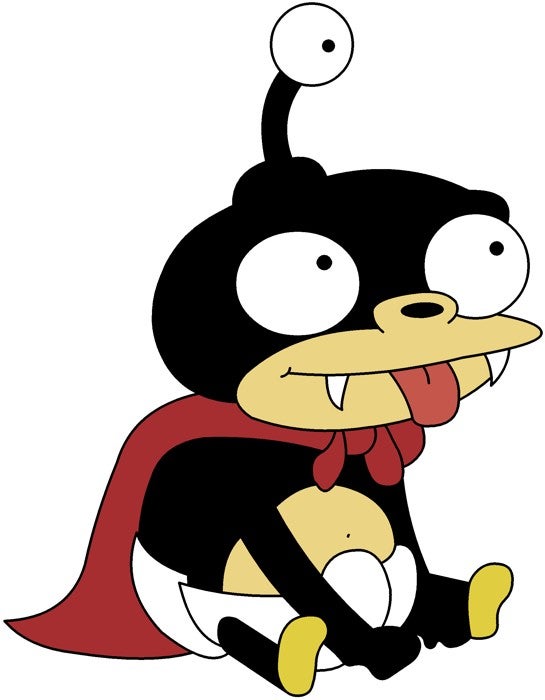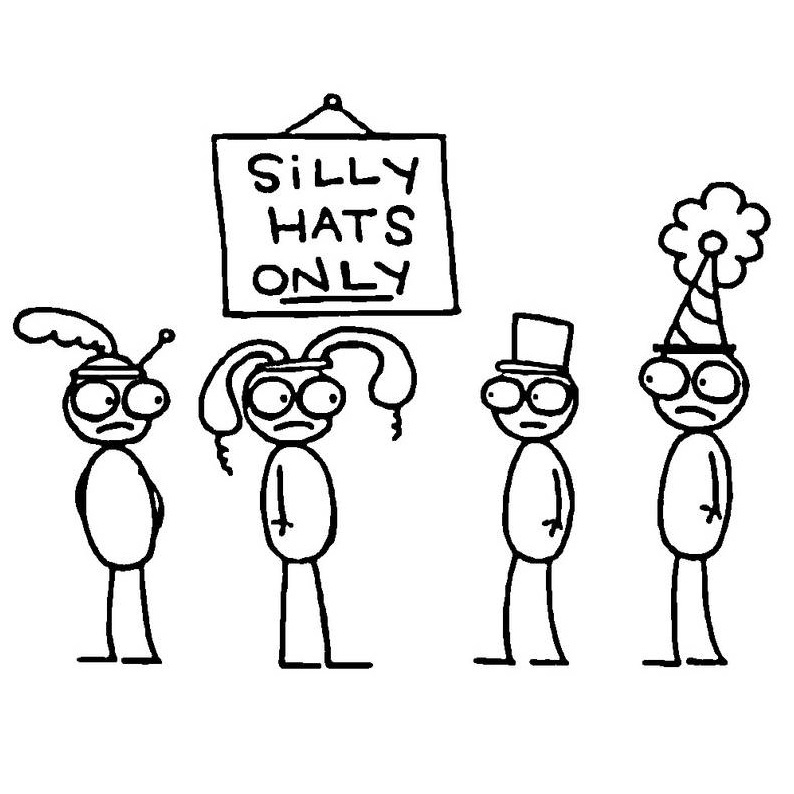Wait until you hear about languages where everything is gendered.
We’re currently debating, whether BürgerInnen, Bürger:innen or “Bürgerinnen und Bürger” is the proper way to address all citizens. This is not even about anything LGBTQ, it’s simply acknowledgement of the concept of non-male people (which is really hard for some conservatives).
I do love a Good Bürger.
Welcome to Good Burger, home of the Good Burger, may I take your order?
I’m a dude, he’s a dude, she’s a dude, we’re all dudes hey!
That’ll be five bucks.
In French we have a similar problem. Currently the most popular form is “citoyen.ne.s” or “citoyen.nes” (besides the good old “citoyens” or “citoyennes et citoyens”), which sometimes gets rendered as a website by some text displayers (e.g. les habitant.es). It’s technically supposed to be a middle dot (citoyen·ne·s) but nobody has that on their keyboard (I literally had to copy-paste it from wikipedia) so people use the point instead. We used to use parentheses like “citoyen(ne)s” but these have vastly be replaced by the dots.
FYI, hold Alt and the press 0 1 8 3 then release Alt.
Doesn’t work on a phone/tablet
If it’s an Android and using Gboard you can go to the symbol tab and hold - to choose the · symbol.
Interesting. In German typography we used to use lower quotation marks at the beginning of a quote and lower quotation marks at the end of a quote, both in handwriting and print:
„Amazing“
But the lower version isn’t found on the default QWERTZ keyboard layout so in personal digital communication (instant messages, emails, etc) especially you find double upper ones a lot:
“Amazing” or ‘Amazing’
The formal spelling rules haven’t been updated and you may still find the lower-upper vision in professional publications where the software adjusts the quotation marks according to a global setting. But most anything that is typed directly by a user will use the lazy lower-lower version.
We actually have the same issue with our « quotes » and accentuated capital letters in French, so « l’État » sometimes becomes “l’Etat”.
I prefer the elimination of gender by using the participle because I think it’s easier to read and say, e.g. instead of Student:In you say Studierende (I guess also using the genderless plural of the participle, similar to the English concept). I’m not sure what the equivalent for Bürger would be though. Geborgene?
Don’t think that works for words that don’t have a verb as a base, i.e. Krankenpflege works because Pflege is a Verb and can be conjugated to Krankenpflegende but Mechaniker:in doesn’t conjugate.
Also Geborgene means nothing even adjacent to being a Bürger. I’d personally would have guessed Bürgende but even that is a major stretch. You would either have to create an entirely new way to conjugate nouns or you have to use synonyms that can be conjugated that way. Both ways will be a huge change to how German is spoken
Why not just use the generic plural form (Bürger) as people always have? It has always been used for mixed groups so why shouldnt it continue to? And sometimes it doesnt even work (eg. for “Bauer”. The plurals would be “Bauern” and “Bäuerinnen”.
The problem people have with the Generischer Maskulinum is, that it is exactly that, the male plural form.
Grammatical genus is not the same as biological gender. Or do people that are biologically neither male nor female need a third plural form?
That would be another advantage if we had a form that clearly eliminates the gender.
Bürgende?
“Liebe Mitmenschen”, meistens ist es nicht nötig, nur diejenigen mit der Staatsbürgerschaft anzusprechen, sondern alle, die in dem Land leben
Portuguese! Even the f…ing objects are gendered!
Most things in Portuguese are gendered, yet we sometimes care fuck all about them (e.g: Sandwich is usually feminine, but it can be masculine depending on who you talk to).
Source: I’m Portuguese.
In brazil sandwich is male and we speak portuguese
Wrong, we speak brazilian
Sorry, i forget that we speak brazilian most of the time and spanish on the weekends
deleted by creator
I’m brazilian too and my sandwich is also male! ♂️
deleted by creator
Me, a german: Why would they not be gendered? At least you have only 2 genders
nO tHeRe ArE iNfInItE gEnDeRs!!!
“mmm this table looks quite feminine to me”
The Austrian state I used to live in (Niederösterreich) actually just outlawed gendering words like that on any government documents. Absolutely idiotic.
Is Bürger not just “citizens”
Male citizens.
Spanish.
Or, you know. Just Bürger, the generic masculinum. That all-inclusive. And it worked for a long time. It’s only because some snowflakes thought they needed something to complain about that we’re having this whole debate.
No it’s not and there’s scientific evidence. Studies have shown that female children will name career paths as their dream job less often if only the male version is shown to them, presumably because they think it’s not an option for them, as it’s perceived to be only possible for males to follow that path. Explicitly mentioning both genders suddenly makes girls also want to become doctors.
You might not like it, but there’s enough evidence to show that it has merit.
“scientific evidence”.
Just like the ‘scientific evidence’ that, for whatever reason, in countries where women are way less free than in the west, many more women go into STEM?
According to https://de.statista.com/statistik/daten/studie/200758/umfrage/entwicklung-der-anzahl-der-medizinstudenten/ since at least 2010 there are way many more women studying medicine than men.
You might not like it, but just because it’s “Die” Sonne And “Der” Mond, That Does not suddenly mean that the moon is male and the sun is female, just how “Der Schüler” Does not imply that they are male or female.
This whole discussion about grammatical gender is stupid and biased as fuck by “researchers” who come to the conclusion they want to come to. I work in academia myself, I know how much bullshit gets pushed through.
Don’t get me wrong, I support anyone being able to do whatever they want. Women can do engineering just as much as men can, same for medicine and everything else. The literal only upside that men have is - on average - higher physical strength. And that just means that a higher percentage of men is strong enough to do certain physical job than the percentage of women. Doesn’t mean the women strong enough to do that job do it any worse than men.
Der bre benutzt einfach “snowflakes” unironisch, was ist das, 2016?
Ja, Kumpel * in dud * in bro* sephine. Diese ganzen Gendersternverherrlicher innen brauchen einfach etwas worüber sie innen sich aufregen *innen könn *innen.
Ausserdem, bro *sephine, hast du mein Profil soweit durchgeschaut dass du rausgefunden hast dass ich männlich bin, oder hast du gerade mein Gender assumiert? Hier hättest du, um deinen eigenen Standards zu entsprechen, ein Genderneutrales Pronomen verwenden sollen, Bro *sephine.
Gerade nachgeschaut. In meinem Profil steht überhaupt nichts zu meinem Gender. Du hast also zwangsweise einfach mal so angenommen, dass ich ein Mann bin. Stimmt das mit deiner Ideologie überein?
Bro ist mir egal ob du den Stern nutzt oder nicht, du bist nur bissl cringe im Internet unterwegs und ich wollte mich drüber lustig machen.
Dass du da nen ganzen Paragrafen schreiben musstest, ist schon telling ne
women right? so annoying…
I wouldn’t mind a generic feminimum just as I don’t mind a generic masculinum. Grammatical gender doesn’t have anything to do with actual gender. It’s just a quirk of the language.
In German:
Man = male (der Mann)
Woman = female (die Frau)
Boy = male (der Junge)
Girl = neutral (das Mädchen)
No idea why lol.
Also I’m learning French and everything has a gender but I don’t see any pattern to it at all. Pizza is female, books are male, a suitcase is female, hats are male and so on.
Also in French, the names of numbers go absolutely mental once you go above about 50. That’s got nothing to do with gender but I want to complain it whenever I can.
Girl = neutral (das Mädchen)
No idea why lol.
Mädchen is a diminutive, and all diminutives are grammatically neutral.
It’s the same in Dutch btw, and my girlfriend who is learning Dutch is frequently abusing this as a cheat code: whenever she doesn’t know the gender of a word, she’ll just use the diminutive and it will automatically be neutral.
I just might have just learned smth about my native language.
I think it’s das Mädchen because it’s a sort of diminutive (by use of chen). But it’s been a while since I studied German.
Correct, all diminutives are neuter in German. In this instance the base word is die Magd (historically the maiden, nowadays the maid), which is grammatically female.
In contrast to Mädchen the equivalent for Junge, „Jüngchen“, has not entered officialese and is seldomly used in colloquial language.
And it is also „das Jüngchen“.
Austrians: da buah
Afaik it comes from Magd, which is female lol.
related to maid, mädel. confer “maiden” in English
Aber was machen Sachen :o
German is so weird. They came up with the concept of a neutral gender, but objects that obviously have no real gender (tables, boxes, sunglasses) don’t use neuter.
Like, what’s the process when they create a new word.
“Computer”… hmm, I think it’s female.
Nah, it’s neuter.
You guys are idiots, he’s obviously male!
Oh yeah, Gunther is right! Look at him!
In gendered languages the “gender” of things other than people doesn’t really relate to human gender at all. It’s just a grammatical construct.
Mostly yes, but a few gendered languages (Wikipedia lists the Yeniseian and most Dravidian languages, Dizi and Zande) use strict semantic criteria, so that the grammatical gender does correlate strictly with the actual gender 99% of the time.
My favourite is some words having different pronouns in different regions. Like der/die/das Nutella, der Butter, das Joghurt 😳
Who the fuck says “der Butter” or “das Joghurt”? Nutella is difficult, because it’s a name.
Einige Regionen in Bayern. In Teilen Österreichs auch gerne feminin die Joghurt
deleted by creator
Because we already had a word for “computer” (literally: calculator) which had the male article so when we started using the English word “computer” we kept the article :)
Computer means Rechner, which is obviously male, because women can’t math. It’s easy if you just think about it.
I’m really curious what the process for it forming was like too but just gonna put it out there that gender in language generally has more to do with tracking what the word is than literally thinking stuff has gender. Originally there was a proposal to call it left and right to make it clear that it’s just a split.
No idea why lol.
This always confused me, even as a native speaker so I looked it up some. Ultimately it’s because modern German is the confluence of multiple older, historic languages one of which came from a tree with a strict male/female rule for nouns while the other one’s grammar defaulted to a neutral case.
As languages merge or adopt from others they often becomes a conjoined mess of multiple rules coexisting at the same time. A contemporary example is that in English the plural of a word is usually formed by attaching the suffix “s” to the singular form, aka house becomes houses. However there’s plenty of exceptions (mouse, mice) in particular if the words stem from a different language (octopus, octopi but nowadays octotuses is also acceptable). In that sense to people not privy to the etymology of words and who only study/learn the language per se there would be no perfectly accurate mechanism to predict the plural of a word.
Also bonus content:
singular: “das Mädchen” (neutral) - the girl
plural: “die Mädchen” (female) - the girls
So in the plural form you have to use a female article again, but the actual spelling of the word is unchanged. Go figure 🤷♂️ 🇩🇪.
“Die” is always the plural article:
DAS Auto - DIE Autos / DER Baum - DIE Bäume / DIE Fliege - DIE Fliegen /
The simple past of read is read, but you pronounce it like red. I assume ever language on earth has its quirks.
In plural every gender has the article “die”
Well at least it consistently unlogical. But wait: it actually depends on the grammatical case for example:
die Mädchen = the girls das Haus der Mädchen = the house of the girls // the girls’ house
So depending on context male, female, neutral articles are all used (der Mädchen, die Mädchen, das Mädchen) 🤷♂️
That’s not a male article, that’s the genitive plural article
It was to make the male seem more important. Even in English the word “woman” comes from “wife man”. Everything was about the pecking order in history. Gender bias was a major part of that.
That’s a misrepresentation of old English. Man used to be neutral, and was modified by were and wif respectively for man and woman. Wife comes from woman, not the other way around.
Ah, yes the famous quatre-vingt-dix-neuf (commonly pronounced “quatre-vingt-deez-nuts”). Numbers are quite a mouthful in French. One of the reasons I erased it from my memory the moment I didn’t need it no more.
So french is just like portuguese, but in portuguese you normally know if something is male or female by the ending of the words (with a feel exceptions), for example pizza is female because ends with “a”
This is the same in french, the gender of words is generally determined by their ending. (Which is not pronounced.)
But French is so hard to find rules about that compared to say Spanish.
English French Spanish ? a mouse une souris el raton / el mouse so in French “-is” is a female ending? a mouse pad un tapis de souris una afombrilla de mouse no, tapis is male, even if souris is female a cable un câble un cable ok, if it ends in “e” it’s male? an icon un icône un icono yes, ends in “e” it’s male! the memory la memoire la memoria no, ends in “e” it’s female! Spanish is much simpler: ends in ‘a’ it’s mostly female (except stupid poema, and a few others), ends in ‘o’ it’s male (except foto, and a few others). If there’s a rule to French I don’t know it, and none of my French teachers knew it. If you’re French, you just grow up learning which words are male and which are female, so French speakers just naturally know and can’t explain it.
Yeah, there are quite a lot of exceptions but “-e is female, otherwise is male” works most of the time. Then if you want to be more precise you can remember some generic exceptions like -age, -isme are male and -tion, -té is female. You’ll still have some exceptions like une souris, une vis, une dent, un câble, un graphe, un cône, une image (exception to the exception) but it probably works in about 80-90% of cases.
(Also “icône” is actually female in French)
Good to know, french is on my list of languages that i wanna learn someday
Ohh oui, french numbers I think they go mental after 69 ( ͡° ͜ʖ ͡°)
70: 60+10 (soixante-dix)
91: 4x20+11 (quatre-vingt-onze)
Why? No clue I am not french.
Mädchen is neuter because it is diminuitive.
Das Häuschen Das Bäumchen Das Hügelchen
and so on. Diminuitive is always neuter, and Mädchen is diminuitive of Magd (or Maid, I forgot).
French here. If you learn in Belgium or Switzerland, they have “septante” and “nonante” for 70 and 90.
It’s for sure more intuitive, but you have to admit that saying “four-twenty-twelve” (non-french speakers: that’s literal translation for 92) is sooooo cool!
I’ll just leave this one for you :)
Here is an alternative Piped link(s): https://piped.video/xX_IOqkRsdw?si=bSwRh7yXyl6NAfT_
Piped is a privacy-respecting open-source alternative frontend to YouTube.
I’m open-source, check me out at GitHub.
Reminds me of a famous quote from Danish humorist Jacob Haugaard:
French is an easy language to learn: a horse is called chevalle and it’s like that all the way
Here is an alternative Piped link(s): https://piped.video/watch?v=9rmBqIFeHN8
Piped is a privacy-respecting open-source alternative frontend to YouTube.
I’m open-source, check me out at GitHub.
They obviously ran out of fingers and toes at fifty, so they traditionally never went any further.
I only speak English but I have always thought we should pronounce 11 through 19 as tendy one, tendy two, tendy three, tendy four… tendy nine, twenty.
I hate to break it to you bub, but it appears that you don’t speak English either.
I don’t know why, but that’s disgusting
so you pronounce eleven as tendy one?
Eleven through nineteen do not follow the same naming convention that the twentys, thirtys, forties and so on do. For example, fifty one, fifty two… Instead of eleven it should be tenty one. The pattern should match.
As a consequence my Taiwanese husband calls his mum “he” and his male friends “she” in English lol
My Chinese wife does this all the time.
It can make following a story so hard because people with gendered pronouns hang so much of the story on she said that to him and when the pronouns switch mid story even though she is still talking about the same person I am instantly like wow this doesn’t even make sense. How is he now saying stuff to her, I thought he blocked her or something similar.
That is kinda weird. There certainly are different sings for “she”/“她“ and “he”/”他” in chinese characters. Though, both signs are pronounced exactly the same.
Chinese characters are their own language. You don’t read them so much as you translate them. That’s why Chinese folk can mostly read written Japanese even though Japanese and Mandarin have almost nothing in common.
Chinese folk can mostly read written Japanese
This is 100% untrue unless you’re talking about menus and such. Japanese uses three other writing systems (counting Roman letters) two of which Chinese speakers are not going to know without study. A handful of the hiragana/katakana still look and are pronounced like the old Japanese kanji they came from, but those also were not Mandarin but from other dialects of middle Chinese (I want to say there was a lot of Wu, but I can’t recall for certain). EDIT: and even knowing how to read them is going to be useless in the most important case, which is that they conjugate verbs, and do other very important lifting in the language.
Japanese, on the other hand, can read a lot of the kanji, but aren’t going to necessarily get a lot out of anything because Chinese grammar is so radically different to Japanese.
Both will have trouble with characters whose meaning for the same character differs in the other language, and potential difficulty with characters invented in one of the countries independently.
Source: live in Japan, married to Japanese, a number of Chinese friends (mostly Taiwan and HK, but a few mainland)
Edit: sample sentence: 猫がネズミに食べされました。Here it is with the kanji for ネズミ instead, which would give Chinese readers a better chance: 猫が鼠に食べされました。However, I don’t think a Chinese speaker with no internet/dictionary and no previous knowledge of Japanese is going to get the meaning correct. The second one with the kanji will fair better, but I still suspect it would be wrong.
Here’s another one 猫が鼠にご飯を作ってくれた。
I agree with you about not being able to get hiragana and katakana, but it was very manageable to travel through Japan with no dictionary . I also carried a notebook where I was writing Chinese and showed it to random Japanese people and they almost always got the meaning. Obviously your first example is a bit mean, because you’d know what a Chinese speaker would interpret it like. But this sentence won’t exist in the “wild”. The second example is a bit easier to get. A lot of assumptions are coming with this “on the fly” translation. For example I played dark souls in Japanese but I don’t speak it. It was manageable to play when there were enough Kanji, because of how items were shaped etc. A lot of assumptions but it kinda works
Yeah, I can read Chinese restaurant menus OK (usually; some names are less literal and I have no idea). From what I’ve seen on the net, I could deal with some navigation.
My sentences are a bit mean by design, but even a lot of signs use grammar like that.
For anyone wondering, the sentence might look like “the cat ate the mouse” but it’s actually the opposite (cat was eaten by mouse). More polite japanese grammar indirects things a lot and it can be really rough. For example, official documents, credit card applications, and a lot of signs. I’ve been in Japan most of a decade and it’s still tough
Interesting! Thanks for the insight. I also find it interesting that Japanese sometimes use their own Version of Kanji, neither traditional nor simplified Chinese. Like 楽 vs 樂 vs 乐。 Oftentimes the Kanji use feels “archaic” in contrast to Chinese to me. Not sure how to describe it. Maybe words like 駅? I can’t think of a good example from the top of my head but maybe you know what I mean?
Japanese went through its own kanji simplification over time, codified in the postwar period.
Also, some characters were invented at different times, including when Japan was mostly in its sakoku period (no foreigners in/out except at the trading post in Dejima).
I’m basing that on my Chinese coworker, who travels to Japan on business but doesn’t speak the language. Of course she can’t read hiragana or katakana, but she says she gets the gist of the Kanji.
I doubt she could read a novel, but she’s not illiterate when she’s there like I am.
(There’s little point to throwing Kanji at me, BTW - when I lived there I was young and more interested in looking for a good time than learning the language, unfortunately.)
It’s not weird to mix up he and she when they’re never used in spoken language…
I also do this from time to time, but I’m Hungarian. Our politicians however will “save” us from the decaying western liberalism, which is more important than schools, heath care, etc.
As a Chinese native speaker, I also find myself messing up he and she all the time.
My native language is genderless so I really dislike all the gendered grammar and words in different languages. English is very easy but in other cases when you start to have a male and a female version of each word which sometimes can be irregular and give you the clue that ohh yeah this should be male but noooo it’s female and in many cases there is just simply no logic behind them it is just the way they are.
English is barely gendered. In Slavic languages, as someone said, verbs are conjugated differently based on gender. In Serbian for instance, to say “I saw him”, you would say “Video sam ga” if you were a man, and “Videla sam ga” if you were a woman. In Arabic I think even more things vary based on gender, like “to you” has different forms based on whether “you” are a man or a woman. It might not be specifically that, but I distinctly recall Arabic using gender-based forms for something that Slavic languages don’t.
Hell, German has three genders. “The” is translated der, die or das depending on the noun
Three genders, and 5 words for “the”: der, die, das, dem, den. Depending on the gender of the noun and its function in the sentence.
You forgot “des”
Serves me right for trying to show off :D
Yeah, I meant 3 words for the nominative case but your answer is more exact
Yeah Arabic is pretty gendered
German even has a neutral gender because two aren’t enough of a headache lol
Plus 4 cases which makes it so that there are 16 (Masc, Fem, Neutr, Plural X 4 cases) different ways of typing an article depending on the gender of the word and what the word is doing whereas in English this is all replaced by “The”. And don’t forget about declining the adjective and the noun in some cases.
Rant over.
So just get the whole country to use one “the”, simple 😎
… Aaaand as it turns out, most European languages are gendered. At least more gendered than ours.
In most European languages you have to worry about misgendering a table.
Pronouns? In Polish we have gendered verbs.
Slavic languages rise up! Eat the
richpronouns! /sdeleted by creator
Yeah, this is a whole thing. In Portuguese, like most other Romance languages I believe, every single noun is gendered, so cars are male, houses are female, and so on and so forth. We have the male pronoun ele (he) and the female one ela (she), and besides these there’s also a neutral isso (it) but using that to refer to someone is very rude and dehumanizing, so we basically have no neutral pronouns (when talking about multiple people you generally use the plural male pronoun eles unless they’re all women, but some people think that’s kinda sexist I guess).
Some people have been trying to create new pronouns to fix that, such as elu, elx and ile, all of which have seen very limited adoption. I like to consider myself a progressive and inclusive person but I just can’t bring myself to use these new words, they all sound terrible, it’s like I’m butchering the language. So yeah, when talking about someone you don’t know in Portuguese you basically have to guess their gender or just ask them what they like more.
I was just going to come and say basically the same. Portuguese has everything gendered, all words, impossible to speak without it. I would very much like to a have a non-gendered language.
Native Spanish speaker here and I 100% agree with you.
Exactly, it’s painful because I want to be respectful and use a more neutral pronoun but none of the ones people created really feels natural to pronounce and it’s always awkward when someone tries to use them in conversation. Now the they/them in English rolls off the tongue and I use it all the time without realizing.
My current strategy is to address someone by whatever pronouns I think is correct and if they correct me then I just ask for forgiveness and use the one they prefer
My strategy is to look grumpy and hope no one talks to me.
It was my strategy before pronouns became a thing and it suited me fine then, it suits me fine now
Now the they/them in English rolls off the tongue
No, it doesn’t. It’s really awkward.
Canada has a player on the women’s national soccer (football) team who wants people to use they/them pronouns when referring to them in the third person. It leads to trying to create sentences like “they’ve been playing well today but they haven’t”.
And it would be impossible to replace one of those pronouns with “the team” or the player’s name. Completely impossible.
I feel like when you say that out loud it’s actually very easy to understand due to intonation.
They (singular) has been used since at least Shakespeare, so every single student in an English-speaking country has learned how to use it correctly; including how to format sentences using singular they. ‘The firefighter rescued a puppy from a burning building; they were really lucky they spotted the puppy in time.’ In any sentence where two pronouns are the same, you’d replace one or the other (preferably the latter though the ‘rules’ on this are stupidly complex). Alex was drinking Jim’s coffee. He should really buy
himJim a replacement.
you basically have to guess their gender or just ask them what they like more.
That seems like a perfectly reasonable way to proceed. Why would that be an issue?
If they don’t want to be called either, which I think is reasonable. Or if you’re talking about someone who you don’t know, we don’t have this problem because they is just so general
Same as Spanish but we do use neutral nouns, I am not into bastardizing my native language when this same people can not speak good grammatical Spanish. The best we could have is a linguistic academy as RAE.
Interestingly, written Chinese does have a gendered ‘she’ pronoun, 她, but it’s pronounced the same as the male one, and it’s a recent invention meant specifically to improve compatibility with Western languages.
Also, if you want a sample of how this works in English, the narrator / main character of Ann Leckie’s “Ancillary” trilogy doesn’t understand gendered pronouns and constantly gets them mixed up.
Except in that trilogy, in their language everyone’s a “she”. So, it’s not like the narrator constantly flips back and forth between “he” and “she” randomly, it’s just that the default is “she” when talking about a person, and the narrator has to make a real effort to use “he” when it’s appropriate.
It’s different following a story from someone who speaks a language without genders (say Chinese) or one with different rules about genders (Spanish). A Chinese person will often just use the wrong gender, and won’t be consistent about it. What’s really weird is that in Spanish the gender goes with the object being possessed, not with the possessor of the object. The third person pronouns don’t have gender of their own, it’s just “su” or “sus”. So, “his house” is “la suya” because houses are female, her books are “los suyos” because books are male. That leads to all kinds of confusion over things like “his wife’s friend” or “her brother’s job” when trying to translate to English on the fly.
And there’s also 你 / 妳 that are used in some places or situations.
yeah debates over Neo-pronouns are always a really tedious Anglo-centric thing. it’s not something that the majority of trans people worldwide are even able to care about
Yeah I feel some groups would have been better served getting on the gender abolition train rather than gender overspecialization; but it’s nicer to feel like you can pinpoint exactly where you belong than let go of the sillier social constructs in a world so invested in making them artificially important.
well artificial or not they are still important. it could be argued that our connection with reality itself is a social construct, at least insofar as we think in language and comprehend the world through language.
pronouns aren’t just jewels bedazzling our language. They’re a fundamental grammatical part of it. the language through which we understand the world only holds up with some basic underlying structures. so how we choose what words to use to stand in for something really shapes how we understand that thing.
It’s even more complicated by the fact that English pronouns have historically tended to be a closed class of words. the language has never readily coined or adopted new pronouns in the way we adopt new nouns and verbs (i.e., “google it”). that’s not to say it’s impossible for pronouns to become open-class and for neo-pronouns to work, but it’s fighting a battle against not just modern biases but also centuries (millenia?) of fundamental structure.
If you don’t use someone’s preferred neopronouns you are LITERALLY committing genocide against trans people. That’s right, not using the preferred neopronouns is as grave a sin against humanity as any famine, plague, or murderous policy.
Oh fuck off, attitudes like this one are the reason we can’t actually grow in this discussion.
Just for clarity, are you serious (or is this a joke)?
They are neither being sincere nor joking. They’re creating a strawman through hyperbole to suggest that anyone who cares about pronouns is deranged. In reality, usually when someone gets upset about pronouns it is not because their neos weren’t used, it was from being deliberately misgendered as an attack on them despite knowing the preferred he/she/they pronouns.
The person used “literally” so even if it were serious then it can still be completely ignored as per the “litchally” policy.
Same for anyone who says “action the ask to reduce the spend”, although those poseurs are hunted anytime they leave the car lot.
Honestly I wish English was less gendered than it is.
E.g. Nephew/Niece, why is there no proper gender-neutral one. This isn’t just for LGBTQ stuff, just seems silly to have everything gendered in general
See: Nibling
Nibbler?

Fair enough, learn a new thing each day haha
Altho I think it still says something about how we use English that I don’t think I’ve ever heard that used
Agree. Your point still stands. I just like that word.
It’s also fairly recently either created or revived largely by nonbinary folks
Pibling (parent-sibling). Spanish speakers also have Titi (combining tio and Tia) and Italians (but NOT French) can use Zizi.
There’s also Unty and Auncle. I like Piblings though.
but NOT French
What happens if they try? Do they go to jail or is it just a fine?
Zizi is French slang for “penis”
Oh! Yeah, I guess calling your relatives that could become slightly problematic… 😂
The Académie Française shows up and threatens your family.
Nibling is a great word. But we need a neutral version of aunt or uncle.
nunt?
What did you call me?
Aunticle
Pibling!
Sounds delicious…
My language doesn’t even have a word for sibling which has annoyed me every since I learned English 15 years ago.
The gender neutral for nephew/niece is nibling
English lost its genders pretty much by accident.
Here is an alternative Piped link(s): https://piped.video/bKaVI-IStNE
Piped is a privacy-respecting open-source alternative frontend to YouTube.
I’m open-source, check me out at GitHub.
We have a pretty good genderless pronoun, but have also decided that to not assign a gender to a person makes them not human. I’ve been hoping we’d challenge that preconception. Anyone can call me, “it”, anytime.
I call animals “it” sometimes cause their sex is wildly irrelevant to me, and people get so offended lmao
Based, I feel the same
There is: cousin
A cousin is your aunt/uncle’s kid, a niece/nephew is your sibling’s kid
Gender is a myth invented by toilet companies to sell more toilets.
It’s a little known fact that men were created in 1925 by a marketing company tasked with selling urinals.
Are there any myths created by the bidet industry?
I’ve stopped learning Chinese when I left the country. I’ve only had HSK 2, but man do I miss no conjugation, you ate an apple pie for breakfast this morning? Well “This morning breakfast I eat an apple pie”.
You already told it was this mornings breakfast with context.
This is something you really see when discovering another language that is not yours. I’m on Modern Speaking Arabic right now and I see it a lot
Technically it’s:
今天早上的早餐我吃了一个苹果派
Today morning breakfast I eat(了)an apple pie
You have to put the “了” to be correct
了 is kinda like past tense
Then you have Welsh where a lot of things are double affirmed in sentences removing ambiguity. even for the word yes you conjugate your reply as it depending on the quesrion they asked you.
Wyt. (Yes, you are. when asked as Am I?)
Ydw. (Yes, I am.)
Ydy. (Yes, he is.)
Ydy. (Yes, she is.)
Ydych. (Yes, you are. when asked as are We?)
Ydyn. (Yes, we are.)
Ydyn. (Yes, they are.)
How do you pronounce Ydw, Ydy and Ydych?
Oh boy, Welsh is fun. Y is sort of an UH sound, W is a OO sound and CH is A hard back of throat noise you make for the real scottish LOCH
Seems to be like “Eh-dew”, “Eh-dee”, “Eh-dich”, so eh- or uh- for the Y at the start. Welsh IPA guide on wiktionary says Y at the start is like the a at the start of “about”, when it’s not either a single-syllable or in the last syllable of a word, in which case it’s an “eee” sound, like the end of “happy”.
doesn’t Chinese have pronouns though?
她 she 他 he 它 it
or am I missing something ?
They’re written differently, but pronounced the same.
Cries in HSK 0
In Finnish: hän = he/she. No need for gendered pronouns.
Exactly, way too complicated!
Wow! TIL this. I was under the impression that all European languages have gendered pronouns.
Finnish is unrelated to nearly all other European languages
Swedish has more in common with Hindi than it does Finnish, despite being neighbours
Something something husband piece of shit husband?
It’s a manufactured problem by snowflake, conservative douchebags.
We just use the word “they” if we aren’t sure. The types upset by this are dumbasses.
I tried telling this to a someone and they claimed it made sense. Then I ended up using a sentence with they/them replacing genders, inserting the subject’s name where it made sense for clarity. " That is the most confusing text I have ever received."
🤦♀️
I’ve determined this is how she looks like an accepting and inclusive person while actually prefering ignorance.
Me whose native language conjugates verbs and adjectives according to subject’s gender:
wasz język nie wymaga sprecyzowania płci podmiotu w każdym zdaniu?
Also Chinese kind of has gendered pronouns: 你 and 妳, both mean ‘you’ and are pronounced the same but the latter is used in writing to address females specifically. Though this is Taiwanese Mandarin-specific.
edit: 他她 as well obviously
Yeah Chinese isn’t a perfect example with the existence of 你妳 and 他她, etc. Though to be fair I’ve noticed native Chinese speakers get pretty confused by English pronouns and tend to mix them up since it’s mostly optional in Cheese.
Optional in cheese sounds like a lactose intolerant thing (my autocorrect tried putting in optimal and lacrosse, which was funny to me)
I was so confused when I saw your comment abou lactose intolerance and was wondering what it has to do with “optional in Chinese.” It took longer that I’d like to admit to realize that the original comment and yours said “cheese.”
How about Optimal Cheese Macross
Reading through the comments is making me interested in the difference in transgendered people in cultures with gendering versus ones that keep it neutral.
Like if there are more trans in neutral cultures because gendering isn’t as important, and where gendering is cultural there are less due to an ingrainedness of it all?
Gender variant expression is found across all human societies (probably gender/sexual dysphoria too), but transgender identification (and third genders) seems highly culturally dependent.
Hard to know what impact language has. It’s perfectly possible that in cultures without as much linguistic gendering, there’s less trans identification because there’s less gendered language to attach to or push away from.
I don’t think there is much relation between a community using a language with no genders and its transgender population size. Take China for example. The nouns in Chinese are not gendered, and the pronouns used to be gender-neutral until about a hundred years ago when “她” (she) emerged. There are few transgender people in China, partially due to the fact that they are not officially recognized, but I don’t think there would be many transgender people in China even if the government legally allowed it.
That’s a wild take. What makes you say that about China?
Because transgender is a concept that started in the western part of the world. It still has a long way to go to make its way into the East Asian countries. Take Taiwan for example. They legalized same-sex marriage a couple years ago, making them one of the most open places in Asia to the concept of LGB, but there aren’t many transgender people there either.
Oh, so we are just going to completely ignore the long history of thai lady boys and them being a sign of status.
Thai culture is pretty different from Chinese culture (compared to other cultures in Southeast Asia). I did somehow forget the existence of Thailand when making my previous comment though, sorry about that.
So are you going to adjust your statement about transgender being a western creation, or are you just going to keep being wrong?
I am not going to adjust my statement. I feel like you are just looking to start an argument and I politely refuse to participate.
































